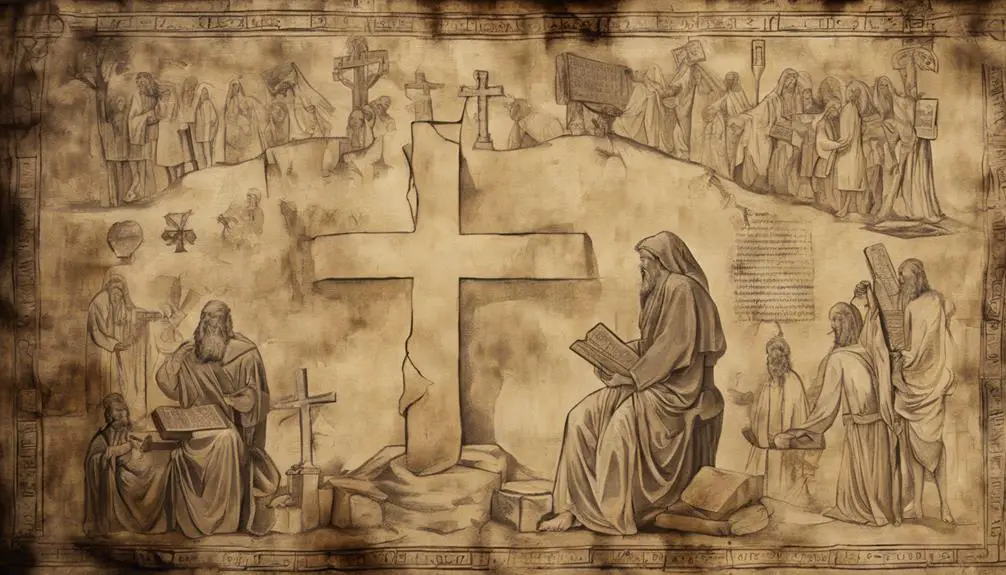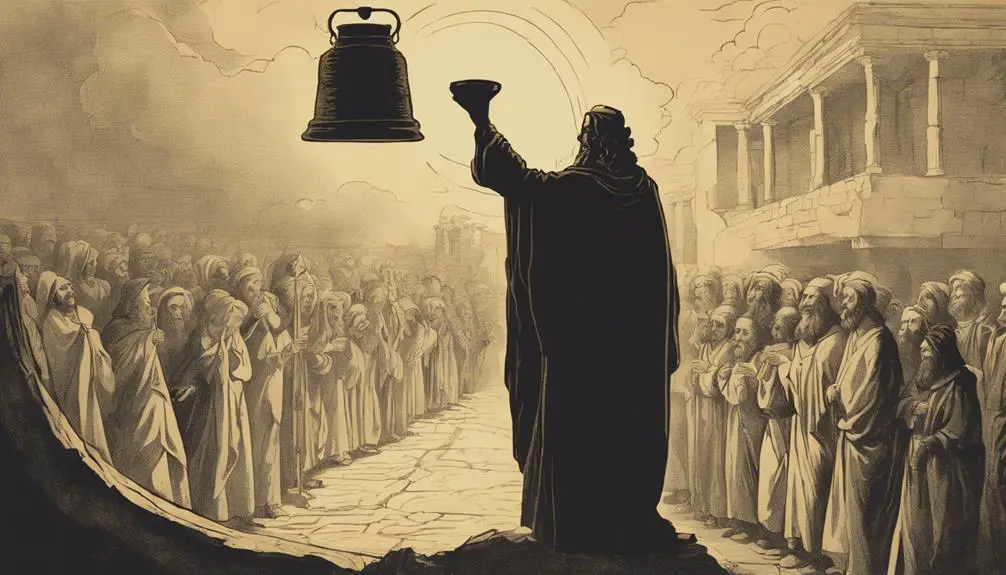Overflowing with spiritual implications, delve into the multifaceted Biblical definition of 'witness' and its profound impact on faith.

Definition of Witness in the Bible
Like a seed planted in fertile soil, the concept of a 'witness' in the Bible holds the promise of growth and understanding.
You might wonder, what exactly does it mean to be a 'witness' in the Biblical context? Is it merely observing an event, or does it carry a deeper, spiritual implication?
The term 'witness' can be found frequently in both the Old and New Testaments, but its interpretation is not always clear-cut. Let's embark on a journey to explore its various shades of meaning, why don't we?
Key Takeaways
- The term 'witness' in the Bible refers to individuals who validate God's actions and convey His messages based on personal experiences.
- Old Testament 'witnesses' served as a bridge between divine revelations and human understanding, embodying accountability and faithfulness.
- In the New Testament, 'witness' involved bearing testimony to Christ's work and resurrection, with the Holy Spirit's testimony reinforcing its credibility.
- Modern interpretations of 'witness' extend beyond recounting events to embodying 'life witness', challenging individuals to actively demonstrate God's love and justice.
Historical Origins of 'Witness

To fully grasp the concept of 'witness' in biblical context, you'd have to journey back to its historical roots, where it held significant religious and societal implications. The 'witness' etymology originates from the Old English term 'witnes', meaning 'testimony or evidence'. This root word 'wit', implies knowledge, often gained through personal experience.
So, what's the legal implication of 'witness'? In ancient societies, a witness was an individual who could attest to the truth of events or actions based on personal knowledge. This role was critical in upholding justice, and the witness's testimony could have life-altering consequences.
The role of a witness wasn't limited to legal scenarios. It also held religious significance. Witnesses were integral in validating religious experiences or divine revelations. They were the bearers of truth concerning God's interaction with humankind, making their testimony sacred and unimpeachable.
Biblical Context of 'Witness

When you delve into the Bible, you'll find that the concept of 'witness' takes on a profound spiritual dimension, serving as a critical link between God's divine actions and humanity's understanding of them. It's not just about seeing or hearing something. It's about experiencing God's truth, embodying it, and then testifying to it. This Witness Authenticity is essential to biblical faith.
Witness Importance in the Bible cannot be overstated. It is through witnesses that God's deeds are validated and His promises confirmed. The faithful witness, then, becomes a conduit of God's divine message, a beacon of truth in a world plagued by falsehood and deception.
Consider the following table for further reflection:
Biblical Witness |
Importance |
|---|---|
Experiencing God's truth |
Validates Divine Actions |
Embodying God's truth |
Affirms Divine Promises |
Testifying to God's truth |
Conveys Divine Message |
In essence, the biblical context of 'witness' is centered around experiential knowledge, authenticity, and testimonial responsibility. It's a call to live out God's truth and share it with the world.
Witness' in the Old Testament

Delving into the Old Testament, you'll find that the role of a 'witness' takes on multifaceted dimensions, serving as a critical bridge between God's divine revelations and mankind's comprehension of them. A witness here isn't just a passive observer but an active participant in God's master plan, involved in prophecy and covenant.
Consider the witness's role in prophecy. Prophets, like Isaiah or Jeremiah, were divine witnesses, entrusted with God's word to proclaim to the people. They didn't merely relay messages. Rather, they bore witness to God's sovereignty and righteousness, calling the people back to obedience.
Coupled with this, the witness's relation to covenant is crucial. In biblical covenants, the witness serves as a guarantor of the agreement, often represented in physical forms, like stone tablets or an altar. They aren't just symbols but active reminders of the covenant obligations and God's fidelity.
In essence, the witness in the Old Testament is a complex, dynamic figure. They not only witness God's actions but also participate in them, providing a tangible link between God's divine will and human understanding, prophecy, and covenant. It's a role that demands responsibility, accountability, and faithfulness.
Witness' in the New Testament

Transitioning into the New Testament, you'll discover that the concept of 'witness' evolves and expands, taking on profound theological implications in the unfolding narrative of Jesus Christ's life, death, and resurrection. The term 'witness' finds its ultimate embodiment in Apostolic Witnessing, where the apostles bear testimony to Christ's works, teachings, and resurrection. Witness Reliability during this era becomes of utmost importance, as the integrity of the Gospel message hinged on the credibility of these witnesses.
To further comprehend, let's look at an overview of the concept of 'witness' in the New Testament:
Concept |
Reference |
Interpretation |
|---|---|---|
Apostolic Witnessing |
Acts 1:8 |
Apostles are empowered by the Holy Spirit to bear witness. |
Witness Reliability |
1 John 1:1-3 |
The apostles, as primary witnesses, verify the life and teachings of Christ. |
Witness of Works |
John 10:25 |
Jesus' miraculous works bear witness of His divine nature. |
Witness of the Spirit |
John 15:26 |
The Holy Spirit testifies of Christ, solidifying the role of 'witness' in divine revelation. |
As you delve deeper, you'll uncover more layers of this multifaceted concept, illuminating the depth of 'witness' within the New Testament.
Modern Interpretations of 'Witness

In the ever-evolving landscape of theological study, your understanding of 'witness' in the Bible broadens as you consider its modern interpretations. The concept of 'witness' has acquired various layers of meaning, with impactful implications in contemporary theology and praxis.
You'll find that 'witness' is viewed not solely as an observer, but as someone obligated to act. This shift has legal implications, invoking a sense of responsibility and accountability in the witness. It's extended to not just bearing witness to an event, but bearing witness to God's truth and justice.
Concerning witness credibility, today, it's not merely about the accuracy of the witnessed event. It's also about the integrity, consistency, and faithfulness of the witness themselves. The witness's credibility is assessed not only on their recounting but also on their lived testimony. This aspect of 'life witness' is a compelling modern interpretation, prompting you to examine your own life as a witness.
In essence, today's understanding of 'witness' in the Bible is dynamic, challenging you to be more than a passive observer, but an active participant in demonstrating God's love and justice in the world.
Frequently Asked Questions
How Does the Concept of 'Witness' Impact Christian Lifestyle and Behavior?
As a Christian, your lifestyle and behavior are significantly impacted by the concept of 'witness'. You're called to witness through service, showing God's love in action.
Your personal testimony influences others, demonstrating the transformative power of faith. You're not just living for yourself, but for a higher purpose, reflecting God's character in your daily interactions.
This constant 'witnessing' shapes your decisions, attitudes, and responses. It's a profound aspect of your Christian journey.
Are There Any Notable Figures in the Bible Who Are Specifically Referred to as 'Witness'?
Yes, there are notable figures referred to as 'witnesses' in the Bible. Prophets often served as witnesses, witnessing through prophecy. For instance, Isaiah is called God's 'witness'.
The role of women as witnesses is also significant, notably Mary Magdalene, who witnessed Jesus' resurrection. These figures exemplify the call to witness in faith, shaping Christian lifestyle and behavior.
How Is the Role of a 'Witness' in Biblical Times Different From Its Legal Sense Today?
In biblical times, witness expectations were more spiritual than legal. You weren't just offering testimony about an event, but bearing witness to God's work in the world. Witness limitations were different too, with less emphasis on physical evidence and more on personal experience and faith.
It's a stark contrast to today's legal witnesses, who are expected to provide objective, verifiable facts.
How Do Different Christian Denominations Interpret the Concept of 'Witness'?
Different Christian denominations interpret the concept of 'witness' uniquely.
You'll find some view 'witness' in prophecy as God's divine revelation, while others see it as a moral guide.
In terms of 'witness' in parables, some denominations see it as relating specifically to Jesus's teachings, while others interpret it more broadly.
It's important to delve into each denomination's theology to fully understand their perspectives.
Does the Term 'Witness' in the Bible Have Any Connection to the Act of Witnessing Miracles or Divine Interventions?
In the Bible, 'witness' doesn't solely relate to observing miracles or divine interventions. It's about 'witnessing faith' and standing firm in beliefs, even when unseen or unproven.
Various 'witness interpretations' exist across Christian denominations, but each emphasizes the importance of steadfast belief. So, while divine experiences can reinforce faith, being a 'witness' in biblical terms really speaks to the endurance of belief in God's word and promises.
Conclusion
In conclusion, you've journeyed from the historical origins of 'witness' to its varied biblical contexts.
You've explored its meanings in both the Old and New Testaments, and pondered modern interpretations.
You've seen 'witness' embody legal testimony, personal experience, and divine revelation.
Remember, as a follower of the faith, you're called to bear 'witness' – to testify truthfully, live authentically, and reflect divinity in your life.
This is the theological richness of 'witness' in the Bible.



Sign up